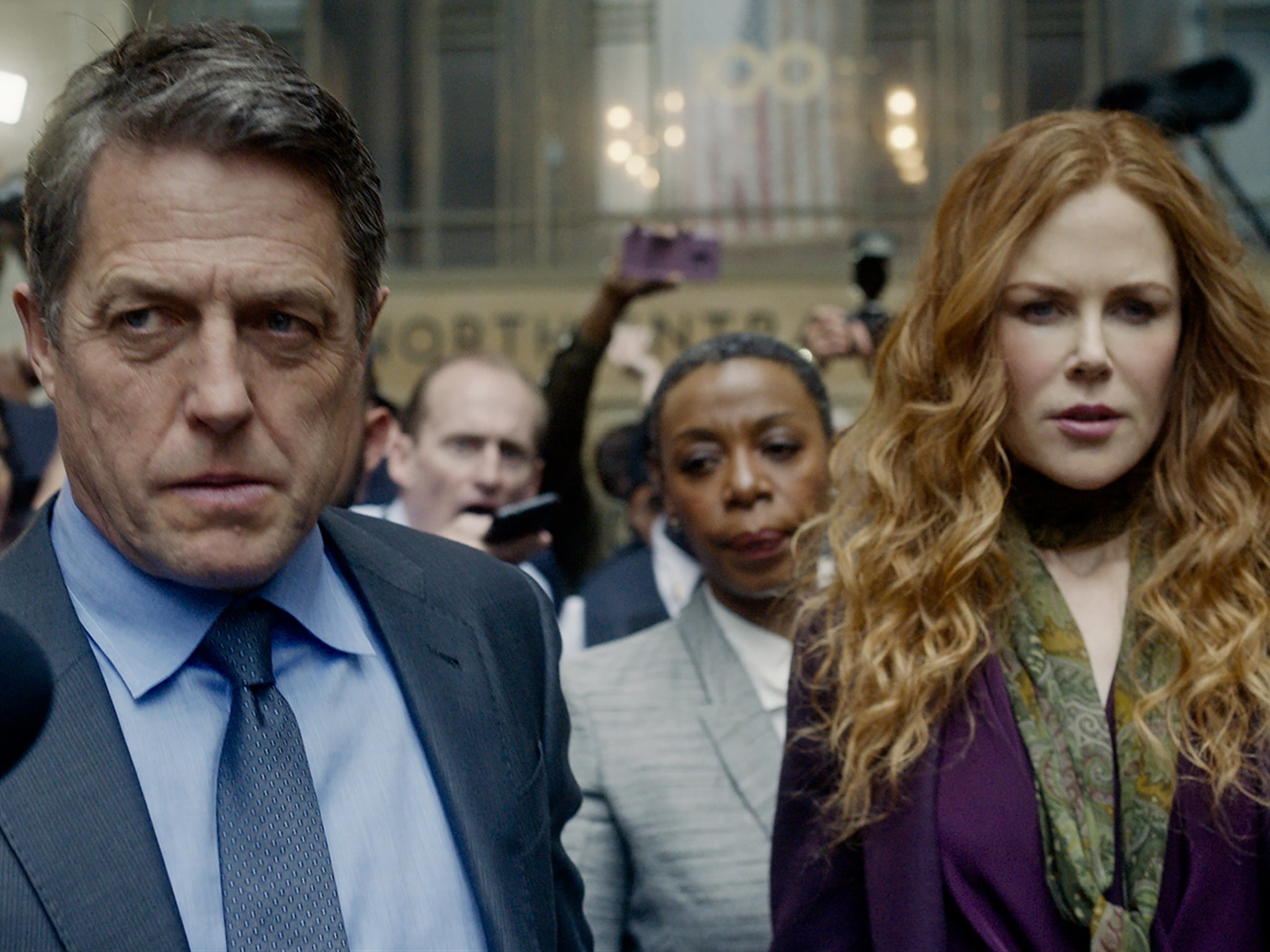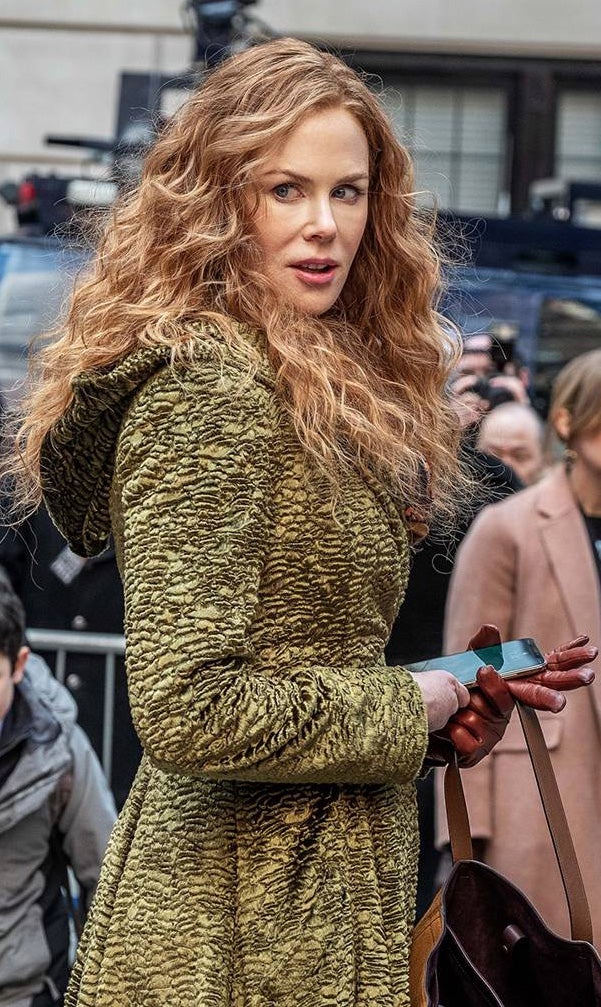The Undoing’s ‘awareness nodding’ is the new virtue signalling
Hugh Grant, Nicole Kidman and lashings of Manhattan wealth porn – but that’s all OK, because the makers added an unnamed black character to point out how obscene it all is. It’s a sham, says Adam White


Your support helps us to tell the story
From reproductive rights to climate change to Big Tech, The Independent is on the ground when the story is developing. Whether it's investigating the financials of Elon Musk's pro-Trump PAC or producing our latest documentary, 'The A Word', which shines a light on the American women fighting for reproductive rights, we know how important it is to parse out the facts from the messaging.
At such a critical moment in US history, we need reporters on the ground. Your donation allows us to keep sending journalists to speak to both sides of the story.
The Independent is trusted by Americans across the entire political spectrum. And unlike many other quality news outlets, we choose not to lock Americans out of our reporting and analysis with paywalls. We believe quality journalism should be available to everyone, paid for by those who can afford it.
Your support makes all the difference.In the fourth episode of The Undoing, Sky Atlantic’s new psychological thriller series starring Nicole Kidman and Hugh Grant as rich New Yorkers embroiled in a mystery, a black news commentator condemns a murder suspect who has paid $12m to be released on bail. “It is white privilege!” the woman cries. “Do you think if he was [a] black man, he would have been granted bail? This was a vicious murder, the woman’s head was nearly liquified, and he’s not a threat to society? It’s obscene!”
The Undoing is wealth porn, saturated in Manhattan high-rises, snooty private schools and gossiping socialites. It also wants to show off its self-aware credentials, its need to explicitly articulate the bubble of privilege Kidman and Grant’s characters exist in, and how money can protect the worst of people. To prove it, that aforementioned black woman is parachuted in to make the subtext literal text. She is, it should be said, not given a name, and is never seen nor heard from again.
Lazily gesturing to matters of sociopolitical importance has become a film and television standard in recent years. It’s also something of a sticking plaster over a bullet wound. Regardless that the majority of entertainment continues to revolve around the rich, white and heterosexual, and shows like The Undoing do little to upend it, throwaway lines of dialogue nodding to the problem are more and more considered a “good enough” fix.
In September, a scene from the Netflix film Enola Holmes went viral, featuring Henry Cavill’s Sherlock Holmes being alerted to his white privilege by a black character played by actor Susie Wokoma. “You don’t know what it is to be without power,” feminist tearoom operator Edith tells him. “Politics doesn’t interest you … Because you have no interest in changing a world that suits you so well.” The exchange, neatly screenshotted and squeezed into a four-image grid for maximum viral potential on Twitter, was celebrated with any number of “amen!” emojis.
Its viral back-patting was then critiqued by another popular tweet, which questioned why this newfound phenomenon seemed so suspect. “Does anyone else feel like scenes like this – with punchy lines delivered by black/non-white people – in otherwise extremely white movies feels a bit… indulgent?” asked writer Zoe Samudzi. Others followed suit with facts: Edith was the film’s sole person of colour and served barely any function beyond helping educate Holmes, and yet her dialogue was being framed as something worth celebrating.
Any person belonging to a minority group will be used to receiving scraps of representation yet being expected to appear grateful. There have been the peripheral queer characters in Star Wars and the Marvel Cinematic Universe, blink-and-you’ll-miss-them background players who nonetheless receive disproportional column inches about their progressive importance. In 2019, that meant female X-Men and Men in Black characters clumsily critiquing gender bias in their respective franchises, while Avengers: Endgame tossed together its largely undeveloped female superheroes, few of whom had previously interacted, for a single shot of girl-power action in its climactic battle sequence. Characters of colour existing in otherwise white ensembles today tend to be wise and all-knowing, educational figures schooling ignorant white people. Being whole individuals, however, with goals, dreams or desires, is of little importance.
The Undoing picks up the faux-progressive baton from Enola Holmes and runs with it. Kidman and Grant play Grace and Jonathan Fraser, a glamorous Upper West Side couple with glitzy, philanthropic jobs (she’s a psychiatrist, he’s a doctor) and a seemingly perfect life. Entering into it is Elena Alves (Matilda De Angelis), a haunted Latina mother whose little boy attends the same private school as the Frasers’ son thanks to a lucrative scholarship. Men seem to flock to Elena, she appears allergic to clothes, and there’s an erotic charge to her interactions with both Grace and Jonathan. Mild spoilers – she’s also dead by the end of the first episode.
Of the five episodes supplied to journalists, of six in total, only the first feels genuinely propulsive – primarily because the show nods towards a tone that it ends up abandoning by week two. In the show’s earliest moments, Elena is the human embodiment of class warfare, an impostor in a moneyed world she doesn’t belong in, and endlessly belittled and ostracised by her fellow mothers.

Elena is also no Laura Palmer of Twin Peaks, or Mary-Alice Young of Desperate Housewives, women introduced as corpses but who become increasingly complex via labyrinthian flashbacks and unearthed secrets. Despite its early optics, Elena is merely a narrative tool and blank symbol of working-class struggle, The Undoing declining to grant her an inner life or clear motives for anything she does. That the show doesn’t bother to explain how she and her husband (Ismael Cruz Córdova) can afford a second Manhattan apartment, one Elena uses to work on her art and presumably carry on any number of affairs, is representative of how little the show cares about filling in the blanks of her world.

Watch Apple TV+ free for 7 days
New subscribers only. £8.99/mo. after free trial. Plan auto-renews until cancelled

Watch Apple TV+ free for 7 days
New subscribers only. £8.99/mo. after free trial. Plan auto-renews until cancelled
Still, The Undoing wants to have its cake and eat it. When that unnamed news commentator critiques the Frasers’ white privilege and then vanishes, it is the show eagerly presenting a kind of “elevated soap opera” – crafting an illusion of social importance while declining to actually put the work in. It’s not the only thing wasted on the show, with talents like Lily Rabe, Edgar Ramirez and even Kidman herself somewhat adrift with scripts that give them little to really bite into, but it is its gravest error.
Most importantly, no one actually needed The Undoing to be about anything other than bad white people doing bad things in expensive outfits. Perhaps in the hands of a writer of colour, or someone with considerable experience in navigating both working-class and upper-class worlds, it could have been a ruthless exploration into money, race and corruption. But The Undoing’s scripts are credited to David E Kelley, gazillionaire TV titan responsible for LA Law, Ally McBeal and Big Little Lies, who probably hasn’t significantly interacted with normal people for at least three decades. By not just staying in his lane, namely dramatising glitzy rich people problems, he crafts embarrassingly thin social commentary – the show’s characters of colour are props blandly signalling at important talking points.
Whether it stems from a fear of criticism or a need to appear progressive, modern entertainment is consistently straining to demonstrate its self-awareness. It is a mistake, though, leaving work unnecessarily self-satisfied with itself, the easily pleased easily pleased, and those in need of representation once again alienated and undervalued. Racial, sexual and sociopolitical progress is still needed, but it won’t occur when TV and film chooses to point and signal rather than properly engage.

Join our commenting forum
Join thought-provoking conversations, follow other Independent readers and see their replies
Comments